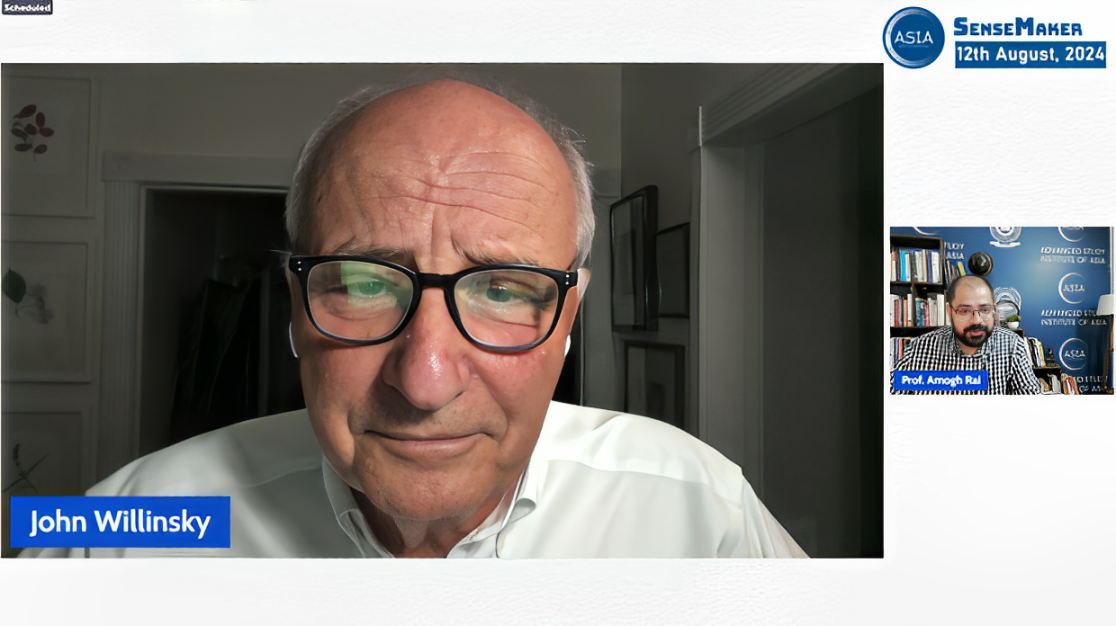ASIA SenseMaker with Prof. John Willinsky
PRESS RELEASE | August 12, 2024
Key Highlights
Impact on India: Suggests that adopting these reforms could enhance India’s global research role, leveraging its strengths in affordable healthcare to support equitable knowledge access.
Reforming Academic Copyright: Professor John Willinsky proposes removing financial barriers to research with statutory licensing and a universal pricing model for journals.
Support for Emerging Publishers: Advocates for increased support to new publishers.
Addressing Generative AI: Highlights the need to tackle copyright challenges posed by Generative AI.
Democratizing Access: Aims to make scholarly work more accessible, promoting inclusivity in academia.


Professor Willinsky highlights the necessity of safeguarding scientific research from potential misuse by big tech. While copyright issues are complex, the law’s flexibility allows for adaptations to new technological advancements.
New Delhi, August 12th, 2024 – In a thought-provoking conversation with Professor John Willinsky, a leading figure in the realm of academic copyright, the focus has turned to the pressing need for reform in scholarly publishing. As an emeritus professor at the Khosla family professor at Stanford University and a co-founder and a founder of the Public Knowledge Project. which today has the open journal system, it has the open manuscript system, and also a system for preprints. Professor Willinsky has been at the forefront of advocating for a more equitable and accessible academic environment.
During a recent ASIA SenseMaker session with Prof. Amogh Dev Rai, Research Director of ASIA, Professor Willinsky outlined a transformative proposal aimed at overhauling the current academic copyright system. The traditional model of academic publishing has long been criticised for creating barriers to access, with high subscription costs limiting the availability of research. This restrictive system hinders progress by keeping crucial information behind paywalls, thereby impeding the dissemination and application of knowledge.
Details of Conversation
Professor Willinsky’s proposal advocates for several key changes to address these issues. Firstly, it introduces statutory licensing for research publications, which would allow research to be freely accessible to all readers, removing financial barriers and democratizing access. This approach is especially pertinent for countries like India, where economic constraints often limit access to cutting-edge research. By making academic work accessible regardless of financial capacity, the conversation aims to foster a more inclusive and equitable academic environment.
Another significant component of the conversation is the introduction of a universal pricing model for academic journals. This model seeks to standardise subscription costs across both established and emerging journals, promoting fairness and ensuring that access to research is based on the merit of the work rather than financial resources. This initiative is expected to level the playing field and enhance the accessibility of high-quality research globally.
The conversation also includes targeted support for emerging journals, which often struggle to establish themselves in the competitive publishing landscape. Drawing parallels with the music industry, Professor Willinsky advocates for nurturing innovation and diversity in scholarly publishing by providing specific assistance to new publishers. He also underscores the importance of preserving historical research to keep valuable older works accessible and relevant in contemporary academic discourse. This approach echoes recent movements in the music industry, such as Taylor Swift’s advocacy for artist rights and fair compensation, which highlight similar copyright reform issues aimed at addressing inequities and ensuring fair access and remuneration.
The implications of this proposal extend beyond academic research. With the rise of Generative AI (GenAI), such as ChatGPT and Claude, there are concerns about regurgitation of content rather than true creativity. Professor Willinsky acknowledges the need to address these concerns within his copyright framework. The legal implications of AI’s ability to scrape and use web content are still unfolding, with ongoing cases exploring what constitutes fair use. Many publishers have already taken a stance against granting authorship to AI systems, impacting copyright protection for AI-generated works.
Professor Willinsky highlights the necessity of safeguarding scientific research from potential misuse by big tech. While copyright issues are complex, the law’s flexibility allows for adaptations to new technological advancements. Legal structures and court decisions will play a crucial role in shaping how copyright can protect research in the age of AI. Professor Willinsky remains optimistic about the adaptability of copyright law, citing its history of evolving with technological changes. The legal framework can continue to address these new challenges, ensuring the integrity and accessibility of research.
India, a global leader in the pharmaceutical sector renowned for its expertise in generic drug production, stands at a pivotal juncture in adopting a transformative copyright framework. Embracing the proposed changes could significantly enhance India’s role in global research and innovation, leveraging its burgeoning academic community to tackle critical healthcare challenges and more. India’s prominence in the generic drug industry underscores its vital contribution to making essential medications both affordable and accessible worldwide. As a leading producer of high-quality, low-cost medicines, India embodies the core principles of access and equity that Professor Willinsky advocates. By aligning with these principles, India can further its commitment to removing barriers to access, resonating deeply with Professor Willinsky’s vision for a more inclusive and equitable academic landscape.
For any query, please contact communicationdvancedstudy.asia or visit https://asiaresearch.co/



